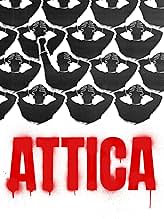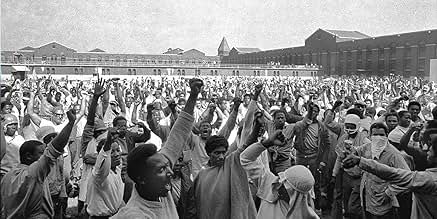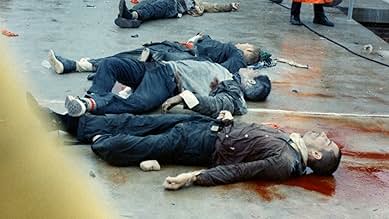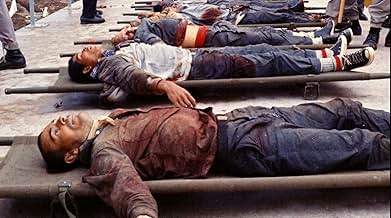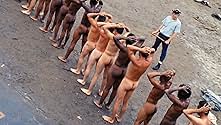Füge eine Handlung in deiner Sprache hinzuThis unnervingly vivid dive into the 1971 uprising from Emmy® winning director Stanley Nelson sheds new light on the enduring violence and racism of the prison system and highlights the urge... Alles lesenThis unnervingly vivid dive into the 1971 uprising from Emmy® winning director Stanley Nelson sheds new light on the enduring violence and racism of the prison system and highlights the urgent, ongoing need for reform 50 years later.This unnervingly vivid dive into the 1971 uprising from Emmy® winning director Stanley Nelson sheds new light on the enduring violence and racism of the prison system and highlights the urgent, ongoing need for reform 50 years later.
- Regie
- Drehbuch
- Hauptbesetzung
- Für 1 Oscar nominiert
- 2 Gewinne & 14 Nominierungen insgesamt
Empfohlene Bewertungen
And what were they insisting on? "Let's give equal weight to abuse and racism." Give equal weight to little medical care, denying right to practice religion, even petty abuse like one roll of toilet paper a month. Give equal weight to the fact that all guard deaths were by friendly fire by incompetently planned attacks.
Some of it is remarkable, white prisoners admitting they got favored treatment. This is the most insightful of the Attica documentaries or films based on the hostage crisis.
Attica is one of the better journalistically sound docs I've seen in the last ten years. It's about the 1971 uprising at the Attica Prison in New York State that shined a spotlight on the brutal conditions inmates endured, but ultimately resulted in a massacre.
The recollections from former inmates, government officials, family members of guards, and journalists do most of the groundwork here. But, there's a massive amount of arrival footage including horrific images of the aftermath that leave indelible conclusions about what happened.
In the end, what happened is that there's a lot of blame to go around for what went wrong.
And, without directly commenting on it, documentarian Stanley Nelson Jr.'s film also points out that 50 years later much work at improving race relations needs to be done.
Couple of comments: this is the latest from Emmy-winning and veteran documentarian Stanley Nelson ("Freedom Riders"). The documentary opens with talking heads, as there wasn't archive footage of the situation until local (and later national) TV stations started covering the events. When watching a documentary like this, there are 2 separate aspects: the underlying events giving rise to the documentary, and whether the documentary itself is any good. As to the underlying event, let's be clear: this is unbridled white power abuse (and worse), pure and simple. If you object to the term "white power", well it's actually uttered by a New York state trooper at the Attica scene, right then and there, with a smirk on his face and without any awareness that, you know, this may not be the best thing to say out loud. But no, he doesn't care one bit. One might expect such scenes to come from the South African apartheid regime, but this really happened right here in the US, a mere 50 years ago. As to the documentary itself: the initial 90 min cannot prepare you for what you will see in the last 30 min of the film. Nelson and his team have painstakingly gone through the archive TV and film footage, and it is a veritable treasure trove on one of the most sickening events in the modern history of this country.
"Attica" premiered at the Toronto International Film Festival on 9-9-21, exactly 50 years after the Attica prison riot started, to immediate critical acclaim. The documentary recently premiered on Showtime, and is now available on SHO On Demand (where I saw it), Amazon Instant Video and other streaming platforms. If you need a reminder as to how unbridled white power has functioned in US history, you can do a lot worse than seeing this documentary, Of course, don't take my word for it and hence I urge you to seek out this film, and draw your own conclusion.
Wusstest du schon
- WissenswertesIn 2022, the film was selected for preservation in the National Film Registry by the Library of Congress as being "culturally, historically, or aesthetically significant".
- Zitate
Self -- Former Attica Prisoner: You either shut your mouth, or you were in big trouble. Some people died. Some were crippled. Some were psychologically damaged for life. And, uh, it was a bad place to be.
- Crazy CreditsEnd credit title card #1: "29 prisoners and 10 hostages died in the assault on Attica prison. All were killed by law enforcement."
- VerbindungenFeatured in Die 94. Oscar-Verleihung (2022)
Top-Auswahl
- How long is Attica?Powered by Alexa
Details
- Laufzeit1 Stunde 56 Minuten
- Farbe
- Seitenverhältnis
- 1.78 : 1
Zu dieser Seite beitragen



